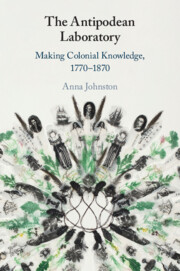
- Publisher:
- Cambridge University Press
- Online publication date:
- September 2023
- Print publication year:
- 2023
- Online ISBN:
- 9781009186896
- Subjects:
- British History after 1450, History, Australian History


In this compelling study, Anna Johnston shows how colonial knowledge from Australia influenced global thinking about convicts, natural history and humanitarian concerns about Indigenous peoples. These were fascinating topics for British readers, and influenced government policies in fields such as prison reform, the history of science, and humanitarian and religious campaigns. Using a rich variety of sources including natural history and botanical illustrations, voyage accounts, language studies, Victorian literature and convict memoirs, this multi-disciplinary account charts how new ways of identifying, classifying, analysing and controlling ideas, populations, and environments were forged and circulated between colonies and through metropolitan centres. They were also underpinned by cultural exchanges between European and Indigenous interlocutors and knowledge systems. Johnston shows how colonial ideas were disseminated through a global network of correspondence and print culture.
‘In this highly readable yet nuanced analysis, Anna Johnston, one of the most original thinkers on Australian colonial culture, shows how texts on, from and about an Australia being colonised, reconfigured both knowledge and social reform endeavours across the Anglophone world.’
Alan Lester - University of Sussex and Professor of History, La Trobe University
‘This wonderful book evokes the tremendous pleasures of reading - but also the crucial work literacy performed in creating imperial knowledge. Deeply researched and beautifully written, Johnston’s study of print cultures and their global circulation makes a distinctively original contribution to imperial history that is at once incisive and a joy to read.’
Jane Lydon - The University of Western Australia
‘From Johnston’s balanced and comprehensive navigation of the now extensive and conflicted field of settler colonial studies, as well as from the evidence she provides in her detailed studies of often overlooked texts relating to her three ‘experimental’ fields of enquiry in colonial New South Wales and Van Diemen’s Land - humanitarianism and Indigenous welfare; convictism and penal reform; and natural history networks - it is clear that no one has thought so carefully about the relationship between knowledge and power in colonial locations, while at the same time paying close analytical and ethical attention to the lived conditions of the production and circulation of various kinds of knowledge, to their mutual dependencies and tensions, and to the collateral and ongoing effects of cross-cultural knowledge exchange.’
William Christie - Australia National University
 Loading metrics...
Loading metrics...
* Views captured on Cambridge Core between #date#. This data will be updated every 24 hours.
Usage data cannot currently be displayed.